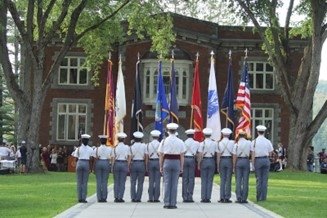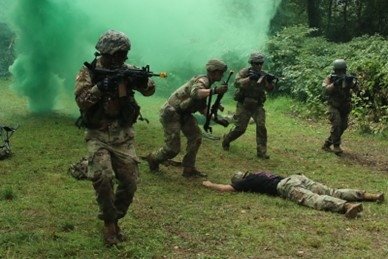- Norwich Blogs
- Blogs
- Inside Scoop - My ROTC and Corps of Cadets Life
Inside Scoop - My ROTC and Corps of Cadets Life
By Ana Lemler
"One of the greatest challenges when joining the Corps is balancing responsibilities. Outside of the Corps, Norwich offers specialty units, clubs, and community service organizations that seek to enrich the cadet leadership experience." - Ana Lemler, '28
In the middle of my college search journey as a high school senior, I was perusing through my emails and happened to stumble upon Norwich University, a senior military college located in Northfield, Vermont. It encouraged me to join the Corps of Cadets and experience a unique college experience in the Green Mountains. I was already interested in a military career, but I had never heard of a senior military college and began researching the Reserve Officers’ Training Corps (ROTC) options offered at Norwich.

Upon arriving at Norwich in the fall for the start of Rookdom, I recognized several differences separating my roles in ROTC and the Corps of Cadets. The Corps is based on Army standards, so all the garrison and field skills I learned were Army. Drill cadence and orders, posting on doors, marching, and squad tactics were all trained and taught through Army field manuals or the Ranger Handbook. Everything I learned on a company or platoon level was taken from Army standards and applied to real-world tactical situations. Even the planning aspect of operations and writing orders was learned to Army standard.
This is to the benefit of Army ROTC because most of their garrison standards were fulfilled by being in the Corps, meaning most of the ROTC training outside of that was field tactics and survival skills. However, the other ROTCs (Navy, Marine, Coast Guard, and Air Force options) had to learn all their garrison skills on top of differentiating them from Army standards. Since I joined Air Force ROTC (AFROTC), I had to divide what I learned in the Corps from the drill and ceremony of the Air Force. Marching is unique to each branch and means relearning another style of command. This also meant less AFROTC time was spent on field tactics and other skills.
At the beginning of the fall semester, the separation was hard to sustain, and I would mix Army and Air Force standards in knowledge, mission order formatting, and rank systems. This was driven by the familiarity I had with the Army system since the Corps is living it every day whilst AFROTC training only occurred three times a week for a few hours. As time went on, I recognized the unique aspects of the Army and Air Force and was able to identify when I had mixed the two to correct my mistakes.

One of the greatest challenges when joining the Corps is balancing responsibilities. Outside of the Corps, Norwich offers specialty units, clubs, and community service organizations that seek to enrich the cadet leadership experience. Specialty units like Ranger Company, Mountain Cold Weather Company, Norwich Artillery Battery, and others challenge cadets mentally and physically while training them in technical skills. Close-quarters combat, clearing buildings, mountain warfare, and squad tactics are some of the many competencies offered by specialty units. Balancing time dedicated to these and other pursuits is a skill in itself.
A contrast between the Corps and ROTC is the responsibilities cadets have. The Corps utilizes the Army framework for rank and structure, but the cadets organize themselves and can gain more responsibility as they gain years of experience. Freshmen can seek out corporal positions in Rook or upperclassman companies and assist juniors with training planning, revision, and execution. Instead of these two options, they can also find jobs in headquarters or provisional companies. In headquarters, they could assist in organizing Corps events such as parades and balls, cataloging and providing supplies for events, exacting discipline, or working with the community and churches for service projects. The provisional jobs are restricted to those who have passed the training for drill, cavalry, or band. Upperclassmen jobs equate to a higher level of responsibility and more important decisions.
While the Corps may take up most of a cadet’s time, their ROTC also places responsibilities on them. First and second years learn the history of their branch and take leadership training classes to prepare them mentally for an officer’s career. Upperclassmen train underclassmen and explore real-world problems addressed by their branch, putting the leadership skills they learned in their first few years to the test. Seniors prepare for commissioning upon graduation.
Although I joined AFROTC at Norwich, I had originally planned on attending a service academy. Like many other cadets, I did not pass through the rigorous application process and had to seek other avenues to become a military officer. I wanted to go to college and gain military experience at the same time. ROTC fits my plan the best because the training is incorporated into the school week. Enlisting or joining the National Guard were other options I considered because they would also pay for my schooling while requiring training to increase my knowledge and capabilities. Many of the cadets seeking contracts in the Army and Air Force ROTCs are encouraged to go through basic training to understand their enlisted better as an officer.
Enlistment and Guard options are readily available in most states, and they allow those aiming to become officers to relate and communicate more effectively with those under their command. However, a less common option is applying for Officer Training School (OTS) or Officer Candidate School (OCS) for the branch a student desires. Civilians with college degrees and prior enlisted can apply to go through these schools which have a shorter turn-around time than ROTC and directly send the graduates to active-duty or reserve locations. Most cadets at Norwich are seeking contracts through ROTC, but a few enlist or join the Guard to help pay off college. Others apply to service academies again while continuing the ROTC path. Before entering the Norwich community, I had only known about the service academies and ROTC avenues to becoming a military officer. Now more options are available, and it allows for flexibility with education and other facets of life.
Norwich is a special environment that offers multiple paths to military or government service. At first, separating what is learned from the Corps and ROTC is tough, but experience clearly separates them over time. The responsibilities a cadet handles also aid in differentiating between the Corps and ROTC aspects. Both offer leadership positions and in-depth experiences to encourage growth through leadership development and self-improvement. Consider Norwich a jack-of-all-trades as a senior military college and come visit.

